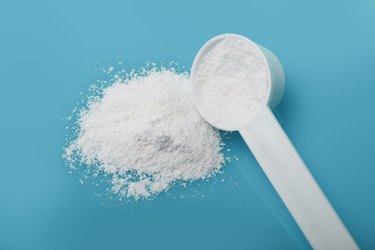
The amino acid glutamine plays an important role in your immune system and can help you recover following intense exercise. Unfortunately, the benefits of glutamine might come at a steep price. The side effects of the L-glutamine supplement include dangerous increases in ammonia.
Read more: Breaking Down Amino Acid Supplements
Video of the Day
Video of the Day
Learn About Glutamine
Glutamine is the most abundant amino acid circulating throughout your body, according to a December 2015 report in Nature Cell Biology. It plays an important role in creating a healthy balance throughout your organ systems. This nonessential amino acid gives your cells the energy they need for day-to-day activities. Glutamine also protects your stomach lining, builds muscle tissue and bolsters your immune system.
This amino acid helps both the healthy tissues and the toxic cells of your body. In fact, cancer cells display an addiction to glutamine. Depleting the amino acid thus might offer a way to treat cancer, but such a treatment will likely cause many unwanted effects as well. Oncologists must, therefore, find a way to block glutamine from cancer cells while letting normal cells receive this important nutrient.
Physiological challenges like exercise lower your natural levels, and you should get extra glutamine during these stressful times. You can reach this goal by eating glutamine-rich foods. The authors of a September 2016 review in Advances in Food Technology and Nutritional Sciences listed the many dietary sources of glutamine. These foods include animal products like cheese, yogurt and meat. Vegetarian and vegan sources include leafy vegetables and beans.
Read more: 10 Essential Foods for Women
Try Glutamine Supplements
You can also get abundant glutamine from a nutritional supplement. These supplements offer you many health benefits. The authors of an October 2015 article in the International Journal of Sport Nutrition and Exercise Metabolism tested 16 healthy adults and found that glutamine helped them recover from an intense bout of exercise. Compared to a placebo, the participants recovered their strength faster and felt less sore after doing resistance exercise.
The amino acid can also change your body composition and hormone profile, according to an April 2012 report in the Journal of Human Sport and Exercise. These researchers had 30 healthy adults take the supplement every day for eight weeks. The subjects also did resistance exercises three times a week during this time. Compared to a placebo, glutamine increased muscle strength and muscle mass. Taking the supplement also increased growth hormone and testosterone.
Glutamine supplements might also help people with diabetes. The writers of a January 2015 article in the journal Nutrition tested 66 patients with diabetes and showed that taking the supplement for six weeks improved warning signs of diabetes. Compared to a placebo, glutamine intake decreased body fat and blood pressure and blood sugar.
Read more: How Much L-Glutamine Should I Take Daily?
Know the Risks of Glutamine
Taking any supplement — including glutamine — puts you at risk for side effects. Many doctors, for example, warn their patients about the possible organ damage caused by dietary aids. Your kidneys release ammonia from glutamine, according to a October 2016 paper in Nature Reviews Cancer. So, taking large doses of glutamine could create excess ammonia. This excess can damage your liver and ultimately your brain.
But this problem is unlikely to happen in healthy people. In fact, even cancer patients rarely experience side effects from taking glutamine. The authors of a March 2017 report in Support Care Cancer tested 56 children with cancer and found that only 2 percent of them had glutamine-related problems during a three-week study. These researchers actually found comparable side effects with glutamine and a placebo.
Because cancer thrives on glutamine, it's also possible that taking this amino acid could promote cancer growth. The writers of a September 2013 article in the Journal of Parenteral and Enteral Nutrition considered this idea in their review of glutamine's side effects. They concluded that scientists need to do more research to answer this question.
Until then, cancer patients should speak with their doctor before supplementing glutamine. Pregnant and lactating women should also meet with a healthcare expert before taking glutamine.
- Nature Cell Biology: "Rethinking Glutamine Addiction"
- Advances in Food Technology and Nutritional Sciences: "Neutraceuticals for Athletes"
- International Journal of Sport Nutrition and Exercise Metabolism: "Influence of Oral L-Glutamine Supplementation on Muscle Strength Recovery and Soreness Following Unilateral Knee Extension Eccentric Exercise"
- Journal of Human Sport and Exercise: "Effects of Glutamine Supplementation on Performance and Hormonal Responses in Non-athlete Male Students During Eight Week Resistance Training"
- Nutrition: "Effect of Glutamine Supplementation on Cardiovascular Risk Factors in Patients With Type 2 Diabetes"
- Nature Reviews Cancer: "From Krebs to Clinic"
- Support Cancer Care: "Glutamine for the Treatment of Vincristine-Induced Neuropathy in Children and Adolescents With Cancer"
- Journal of Parenteral and Enteral Nutrition: "Side Effects of Long-Term Glutamine Supplementation"